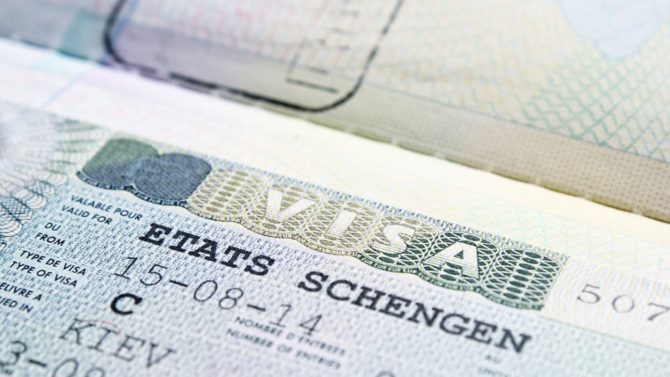The visas you will need as a non-EU resident in France


Americans, Australians and other non-EU residents need a visa or permit in order to visit or live in France – here’s our guide to the different visas and permits and how to apply for them
Do you need a visa?
Those outside the EU/EEA don’t have the same rights of movement as those within it, so visas are required for entry to France. Some countries have a special agreement with France, including America, Australia, Canada, Japan, New Zealand, Singapore and Switzerland (a full list can be found on france-visas.gouv.fr), allowing them to stay for up to 90 days without a visa (to stay longer they have to apply for a long-term visa).
You don’t need a visa if you hold a residence permit for France or any one of the other countries covered by the Schengen agreement. Separate visa regulations apply for entry to mainland France (part of the Schengen Area) and for France’s overseas territories.
Short-stay ‘Schengen’ visa: for stays no longer than 90 days (three months)
These allow holders to move freely in countries in the Schengen Area for up to 90 days per period of six months from your first entry (visas may be issued for one or several entries). They are ideal for those owning a holiday home in France, and are generally issued for tourism, business travel and family visits, as well as short training courses, internships or for artists on tour, sports-people playing in championships etc. A Schengen visa is valid for all 26 states of the Schengen Area (including France), unless marked otherwise on the visa sticker. You can’t work on a short-stay visa.
___________________________________________________________________________
Don’t miss
What effect could Brexit have on British expats in France?
How do non-EU residents buy a property in France?
___________________________________________________________________________
Long-stay visa (visa long de séjour): for stays of over 90 days (three months)
The main reasons for issuing this type of visa are study, work and family reunion. There are different visa categories according to the reason for application, e.g. for holidays (visa long de séjour visiteur), employment (salerié), studies (étudiant) or joining a relative (vie privée et familiale). A long-stay visa marked ‘carte de séjour à solliciter’ shows you are in the process of applying for a residence permit. Spouses of French citizens can also apply for this visa. You don’t have to intend to work, as long as you can demonstrate you have sufficient funds to live off while in France. On arriving in France, you must register with the French Immigration and Integration Office (OFII) or, in some cases, apply to the relevant préfecture for a residence permit.
How to apply for a visa
If you are from certain countries you can apply for a visa online via france-visas.gouv.fr but residents of other countries will have to apply for a visas at the French embassy or consulate in your country of residence (including renewals). The application fee is €60 for a short-stay visa and €99 for a long-stay visa. Application forms and the list of documents and information required can be found on france-visas.gouv.fr .
You will have to show that you have sufficient funds to support yourself during your stay in France, somewhere to stay, and medical insurance with cover of at least €30,000. Applications can be submitted three months before entry to France (the visa can start either on the date of issue or on another date no later than three months after issue).
For short-stay visas, passports must be valid for at least three months beyond the date of expiry of the visa; for long-stay visas of definite duration (long-stay visa constituting a residence permit), passports must be valid for as long as the visa. Passports must contain at least two blank pages to take the visa and the French entry and exit stamps.
___________________________________________________________________________
Don’t miss
How has Brexit affected this expat family in France?
Why did this American couple move from San Francisco to rural France?
___________________________________________________________________________
Carte de séjour (residence permit)
If you want to stay on longer in France, you must apply for a renewable residence permit (carte de séjour) at the local préfecture, within two months of your visa/temporary residence permit running out. You may be required to provide details of your family situation, financial resources and health insurance, as well as proof of your address in France and an employment contract.
The duration of the permit depends on your employment or study status and family situation, but they’re usually for one to four years and renewable. There are also three-year compétences et talents (skills and talents) permits and up to 10-year-long permanent residence permits.
If you have been away from France for more than three consecutive years, your residence permit will expire.
Applying for French citizenship
After living for five continuous years in France (less if you fulfil other criteria such as marriage to a French national or holding a degree from a French university), you may be able to apply for a 10-year, renewable long-term carte de séjour or French citizenship through naturalisation. You will need to fulfil certain requirements, depending on your circumstances, such as proof of marriage, birth certificates and evidence that you have a good knowledge of the French language.
___________________________________________________________________________
Don’t miss
How to become a French citizen
Insider tips for applying for French citizenship
My experience of applying for French citizenship
___________________________________________________________________________
Getting healthcare cover in France
While EU nationals can visit France and use the EHIC reciprocal healthcare card should they need medical attention, those from countries outside the EU do not have access to this benefit.
Certain countries have signed a bilateral social security agreement with France (see the full list at cleiss.fr), but nationals of those that haven’t, which includes America, Australia and South Africa, should check with their home country’s social security system whether and to what extent it covers healthcare costs incurred when overseas.
Visitors are advised to take out a private insurance policy to cover any healthcare costs they may incur while in France; indeed, a private health insurance policy is required for tourist visa applicants.
If you pay into the French social security system (if you’re employed) or have gained French citizenship or are married to a French national, you automatically gain access to French healthcare. But what if you’re not a French citizen and aren’t working? You’ll then need private medical insurance. In fact, in France even those who receive state healthcare usually pay into a top-up insurance fund (mutuelle) as well, as the full cost of medical care is not borne by the state. There are plenty of reasonably priced expat insurance schemes to choose from (e.g. via the Association of American Residents Overseas).
“Currently non-EU nationals who wish to enter and stay in France for more than three months must have a long-stay visa,” says Ron Wright of Exclusive Healthcare, which specialises in health insurance for Anglophone residents of France as well as visitors. “One of the conditions for a long stay visa is to have private health insurance. Such non-EU nationals must apply to the French consulate in their home country for such visas. Each French consulate is responsible for informing such visa applicants exactly what the private health insurance must cover, and these requirements vary from consulate to consulate.”
Like this? You might enjoy:
Brexit: will British expats still be able to live in France?
How to make new friends when you move to France
Inspiring, must-read travel blogs about France
Share to: Facebook Twitter LinkedIn Email
More in Brexit


